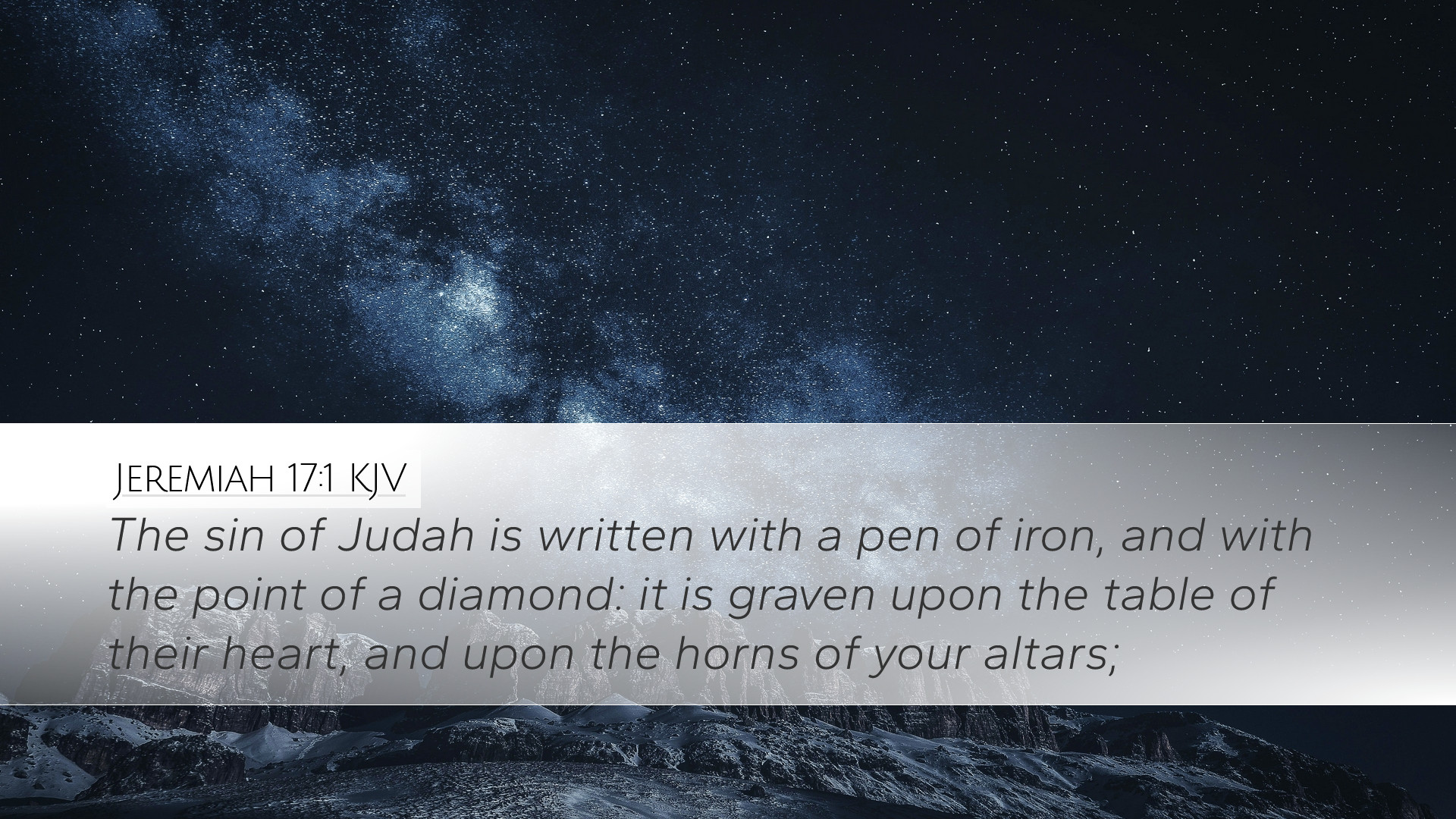Commentary on Jeremiah 17:1
Text: "The sin of Judah is written with a pen of iron, and with the point of a diamond: it is graven upon the table of their heart, and upon the horns of your altars."
Introduction to the Verse
Jeremiah 17:1 presents a profound insight into the spiritual condition of Judah at the time. This verse serves as a deep indictment of the sins that were deeply rooted in the people, illustrating both the seriousness of their transgressions and the permanence with which these sins are inscribed upon their hearts and lives.
Exegesis of the Text
Jeremiah, often referred to as the "weeping prophet," brings a message of judgment but also of hope for restoration. His prophetic ministry highlights the contrast between the faithfulness of God and the unfaithfulness of His people. The imagery in this verse is striking. The use of "pen of iron" and "point of a diamond" emphasizes the durability and permanence of the inscription of sin within Judah.
Symbolism of the "Pen of Iron"
Matthew Henry's Commentary: Henry notes that the "iron pen" signifies that the judgment against Judah is not easily erased; it denotes the hardness and unyielding nature of their sin. Just as iron can carve without the prospect of change, so too have the sins of Judah solidified their fate.
Symbolism of the "Point of a Diamond"
Albert Barnes' Notes: Barnes elaborates on the metaphor of the "diamond," which suggests that the sin is not only enduring but is also precious in its hardness—indicative of the people’s pride and rebellion against God. This diamond-like hardness reflects a heart that is impervious to the calling of repentance.
The State of the Heart
Adam Clarke's Commentary: Clarke reflects upon the phrase "graven upon the table of their heart." He provides insight into how the heart in biblical literature represents the center of emotions, will, and intellect. The engraving signifies that their sin is not merely a surface issue—this sin is integral to their very identity and existence as a people.
Spiritual Implications
The real issue in this proclamation by Jeremiah is the state of the heart. The prophet reveals that the hearts of the people have been marked by iniquity. Their worship at the altars—symbolized here—is also tainted, illustrating a complete disconnect between their allegiance to God and their moral behavior.
Consequences of the Engraved Sin
According to the prophets, engraved sin brings about inevitable consequences. The persistent nature of sin leads to spiritual and physical ruin. The very "horns of your altars," upon which this sin is marked, indicate that their worship practices had become corrupted and ineffective.
Call to Repentance
While the first part of Jeremiah 17:1 focuses on judgment, it also implicitly calls for repentance. Recognizing the engravings of sin must lead to a sincere desire for purification and a return to the ways of the Lord. The awareness of one's own heart condition becomes a crucial first step in recovering true fellowship with God.
Broader Context within Jeremiah
This verse must be understood within the larger narrative of Jeremiah’s ministry. Throughout his writings, Jeremiah consistently highlighted the themes of sin, judgment, and the hope of restoration. In facing the reality of sin, the people of Judah were encouraged to turn back to God, who is always ready to receive the repentant heart.
Theological Reflections
The theological essence of this verse is foundational for understanding the nature of sin. It suggests that sin is both an action and a disposition of the heart. Judah’s engravings serve as a reminder to all believers of the importance of heart integrity and the necessity of continuous repentance.
Application for Pastors and Scholars
This commentary on Jeremiah 17:1 offers profound implications for pastors, students, theologians, and Bible scholars:
- Awareness of Sin: Leaders are called to guide congregations in recognizing the seriousness of sin in personal and communal contexts.
- Importance of the Heart: Understanding the heart's condition is critical for spiritual health. Pastoral care must prioritize heart transformation.
- Call to Repentance: Preaching must challenge believers to address sin earnestly and seek restoration with God.
- Hope in Restoration: Amid the stern message of judgment, there is always the hopeful theme of God's willingness to forgive and restore.
Conclusion
Jeremiah 17:1 stands as a sobering reminder of the enduring impact of sin and the need for deep introspection regarding the state of our hearts. Engraved in our lives are the realities of our choices, and this inscription calls upon us to seek the Lord earnestly. Through the insights of various commentaries, it becomes clear that while judgment is a theme in Jeremiah, it is ultimately intertwined with God’s desire for repentance and restoration.


